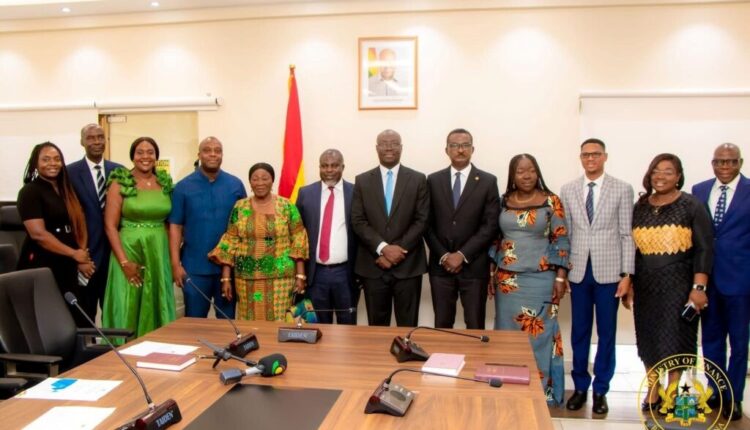Minister for Finance, Dr. Cassiel Ato Forson, has charged the newly formed Governing Board of the Ghana Revenue Authority (GRA), to strategically reform and further calling for aggressive domestic revenue mobilisation as the nation navigates tight financing conditions and dwindling donor support.
The newly inaugurated board, appointed by President John Dramani Mahama, consists of distinguished individuals drawn from various sectors of national life.
The board is chaired by Hon. George Ricketts Hagan, former Deputy Minister of Finance and current Deputy Majority Leader, with Mr. Anthony Sarpong, GRA Commissioner, Mr. Patrick Nomo, Chief Director at the Finance Ministry and Hon. Elizabeth Ofosu-Adjare, Minister of Trade and Agribusiness as members.
Other members of the board include Dr. Zakaria Mumuni, 1st Deputy Governor of the Bank of Ghana, Madam Faustina Nelson, Mr. George Ayiretey, Hon. Laadi Ayamba, and Hon. Francis-Xavier Sosu.
In his address at the ceremony, Dr. Ato Forson expressed profound gratitude to the President for selecting what he described as a “distinguished team of esteemed and accomplished individuals,” each with a proven record of excellence and public service.
“As we inaugurate this Board today, it is important to acknowledge the enormity of the task ahead. You assume this mantle at a time when the government faces significant fiscal constraints, underscoring the urgent need to bolster domestic revenue mobilisation efforts.”
The Finance Minister minced no words about the severe fiscal constraints currently confronting Ghana.
With international capital markets closed to the country following the recent debt restructuring programme, Ghana’s main source of borrowing has become the domestic treasury bills market.
Furthermore, the nation has suffered significant cutbacks in donor support. According to Dr. Forson, development partners have scaled back programme and project grants amid what he termed “today’s era of multiple crises.”
One glaring example he cited was the recent withdrawal of USAID funding, which has cost Ghana over US$78 million in health support and US$156 million across education and economic growth initiatives.
These developments, he noted, present a stark reality: the country must wean itself off dependence on external grants and strengthen its capacity to generate revenue domestically.
“This makes optimising domestic revenue mobilisation the number one priority of our fiscal objective for 2025 and the medium-term.”
The government’s fiscal consolidation programme, Dr. Forson explained, is aimed at transforming Ghana’s primary balance from a deficit of 3.9% of GDP to a surplus of 1.5% by 2025.
An integral part of achieving this goal is a sustained improvement in domestic revenue. According to the Finance Minister, Ghana has set an ambitious but necessary target: to increase revenue collection by at least 0.6 percentage points of GDP annually.
This strategy is also expected to help reduce the external debt service-to-revenue ratio from 28% in 2022 to 18% by 2028.
“In simple terms, every additional tax cedi we can raise domestically is a step closer to freeing ourselves from the shackles of debt dependency and ensuring national economic sovereignty.”
Urgent Reform
Dr. Forson outlined five priority areas requiring immediate attention by the new GRA Board: Firstly, he called for modernisation of the GRA, stressing the need for not just system upgrades but a fundamental transformation in operational efficiency.
According to him, a modern, fully automated GRA would enhance tax collection, minimise avoidance, and improve the overall taxpayer experience.
Secondly, Dr Forson underscored the significance of building a culture of integrity, insisting that the GRA must be built on a foundation of fairness, ethical conduct, and transparency.
Corruption and fraud, he warned, must be eradicated at all levels, asserting that every cedi lost represents a missed opportunity for national development.
“Revenue lost through corruption translates to unbuilt schools, unpaved roads, and lives adversely affected by inadequate healthcare, unsafe drinking water, and poor sanitation. We must uphold the highest standards, rooting out unethical behaviour at all levels, and exemplify transparency, accountability, and service to the nation.”
On combating smuggling, Dr Forson argued that smuggling is not just a tax issue – it’s an economic injustice and national security threat.
He called for stronger enforcement, enhanced intelligence, and close collaboration with other agencies to stem the tide of smuggling that undermines local industries and drains tax revenue.


Comments are closed.